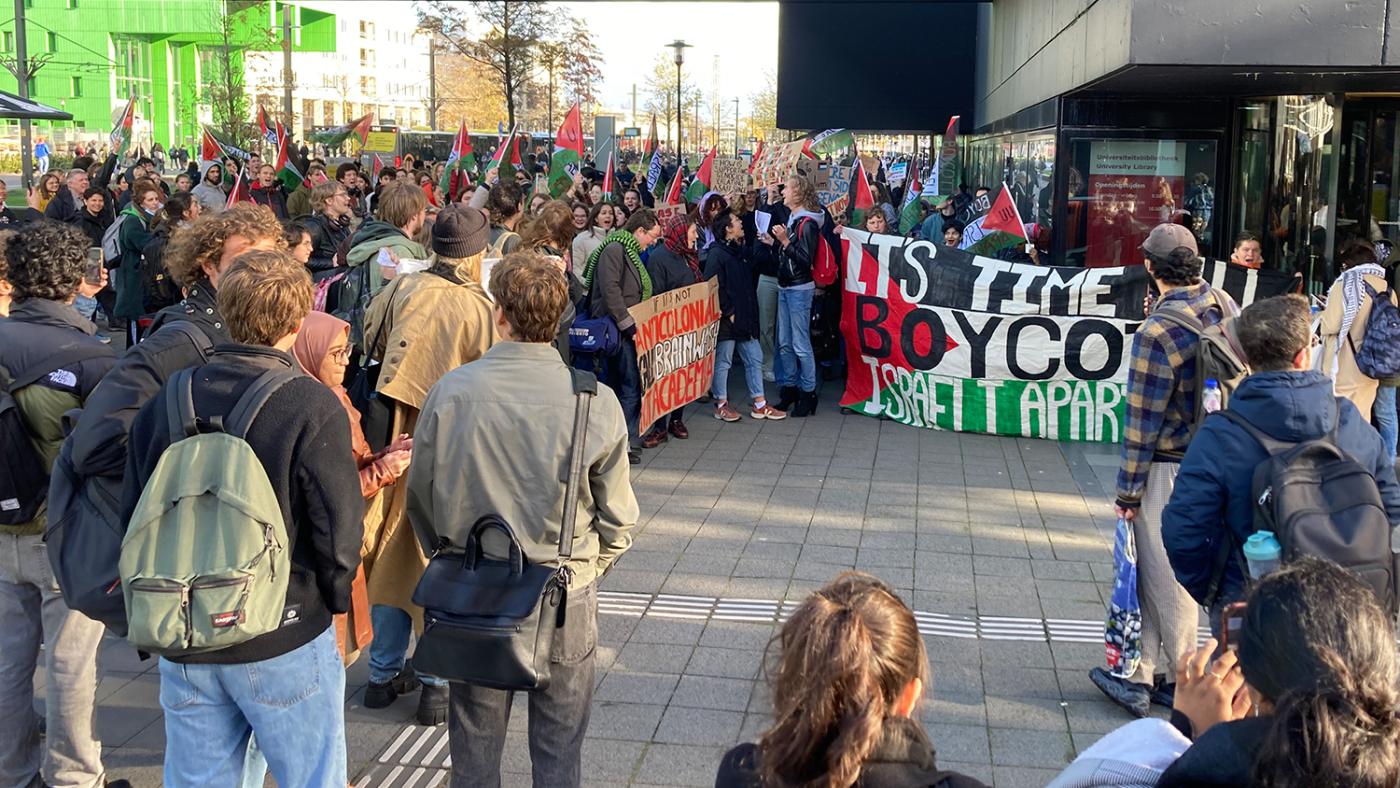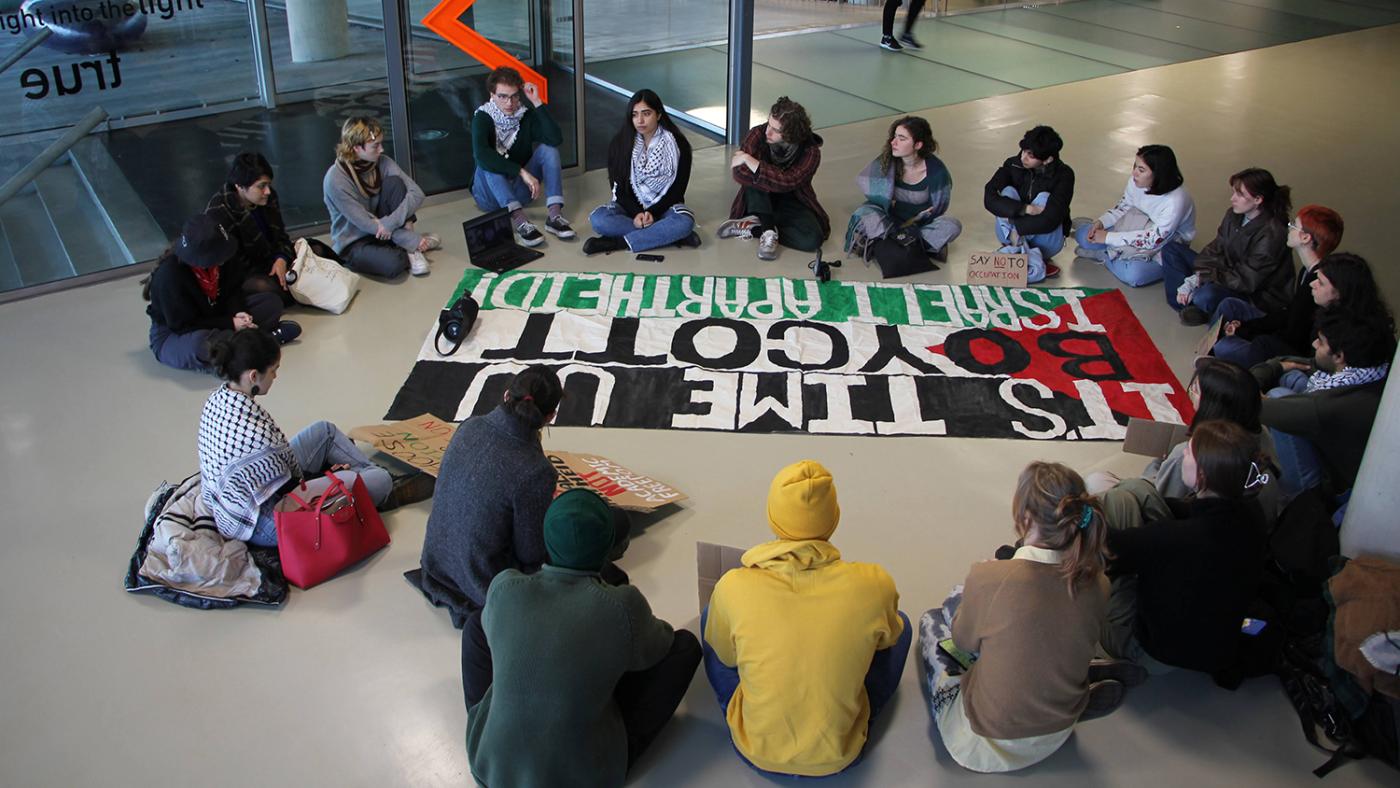Members of the Social Sciences council call for a dialogue
Students feel intimidated by pro-Palestinian protesters

Students Lynn and Mel, members of the Faculty Council at Social Sciences, were there when a pro-Palestinian protester climbed onto one of the tables in the canteen/study space inside the Langeveld building. Other protesters stood around the table as the person on top gave a speech on the situation in Gaza. The place was filled with students.
After the speech, the group walked around asking those present to sign a petition with their first name, last name, and study programme. The petition in question called on the Executive Board to adopt a clear position regarding the conflict.
According to Lynn and Mel, some students felt extremely uncomfortable with that situation, as though they were pressured to sign the petition. “Because of the way they protested, everyone was watching the others sign it. Someone would fill it in and then hand it to the next person. The students didn’t feel like they could say: ‘No, I don’t want to do this.’”
That wasn't the first time that the Langeveld building was the stage of a pro-Palestinian protest. Demonstrators have used the space to raise awareness of the conflict and collect signatures for the petition at least three times.
Multiple demonstrations
Pro-Palestinian demonstrations at the university have been a hot topic for a while. The protest group Utrecht in Solidarity with Palestine has demonstrated several times. In addition to the Langeveld building, they have staged protests at the Administration Building and the university's libraries.
In December, for example, pro-Palestinian protesters disrupted a meeting of the University Council, which had to be put on hold for some time. The demonstrators criticised the neutral stance taken by the Executive Board regarding the war going on in Gaza between Israel and the terrorist organisation Hamas. Some council members felt intimidated by the slogans shouted and the fact that one of the protesters was filming them.
Some students were also frightened by the protests that took place in front of the library. They weren't intimidated by the protest itself, but rather by the way it was carried out. Lynn: "A crowd was shouting and waving flags. The police were there as well."
Statement
According to Lynn and Merel, the conflict between Israel and Palestine is such a hot topic among students that they feel the need to talk to each other about it. Given the concerns raised and the incidents in the Langeveld building, the student members of the Faculty Council of Social Sciences decided to read a statement during the council meeting held on January 23.
“We, from s-guidance (student guidance) have been hearing a lot about the conflict between Israel and Gaza. Pretty much all students are following the conflict, each of them in their own way and with their own opinions. This conflict impacts the students to such an extent that it is obstructing their wellbeing, regardless of what everyone’s view on the topic is.”
They asked the faculty board to support students by "facilitating discussions at the faculty or providing teachers with tools to discuss the topic with students.”
Unacceptable
In a written response, Dean Leoniek Wijngaards-de Meij says: “The faculty board acknowledges that this situation affects many students and employees, evoking feelings such as anger and fear. The protests held in the Langeveld building show that a situation in which students feel pressured to take a certain stance can quickly arise.”
“We find this form of peer pressure unacceptable, which is why these conversations must take place in the familiar context of education. The faculty board is talking to educators about facilitating and supporting conversations about this complex situation.”

Teach-in against the visit of an Israeli delegation at Educatorium, held in 2022. Photo: DUB
Dialogue
Students' calls for a more active role on the part of the university are getting louder and louder. In November, students told the Executive Board of their wish to have conversations about this at the university, especially considering that the informal conversations students are having with each other are becoming ever more intense.
In a memo to the University Council, the Executive Board says that it prefers this dialogue to be based on scientific expertise rather than a debate format as debates "often generate polarisation instead of producing a rapprochement" (the memo is only accessible to those with a Solis ID, Ed.). The dialogues should also be organised within "already existing communities," such as faculties. In addition, a guide on how to address the conflict in class was drawn up. engage in conversation during classes. Several faculties have already organised meetings and gatherings. They all went well.
Safety
UU was not aware of the pro-Palestinian protests in the Langeveld building, according to spokesperson Iris Kruijen. Security wasn't informed that protesters collected signatures for a petition there. Neither were they aware that protesters used the same space to recruit participants for the demonstration held in front of the library in November.
It is "highly undesirable" that students feel intimidated to participate, states Kruijen. "We call on everyone to stay peaceful and respect each other. Make sure there is room for different perspectives."
"That's why we would also like organisers to report protests to us in advance, so we can discuss them and keep an eye on safety. There is a set of rules in place for protests at the university. They should not disrupt classes or research activities, for example. Protesters are not allowed to distribute flyers and they must be respectful of others and the environment. Safety must not be compromised."
Reaction Utrecht in Solidarity with Palestine
"Nearly 30,000 people have died in Gaza and all of its universities have been reduced to rubble. The International Court of Justice is deeply concerned and considers a genocide in Gaza plausible. Unfortunately, some discomfort is part and parcel of protesting against genocide: we owe it to those who have been killed to call our university to action. Police check in sometimes, but a number of our own people always act as the stewards of the protest and ensure everyone's safety.
"At our protests, we share a QR code that links to our petition so that people can read it over themselves. Many people we talk to appreciate being able to speak out in this way. If students, staff or any faculty or university council parties have questions we are happy to answer them."